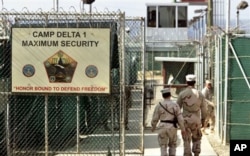Days before the Obama administration is expected to issue a long-awaited plan to close the U.S. detention facility at Guantanamo Bay, Cuba, the Republican-led Congress ruled out a key provision for such a plan to go forward.
The Senate Tuesday gave Congress’ final approval of the National Defense Authorization Act, which, as in previous legislation, stipulates that Guantanamo terror suspects may not be moved to U.S. soil for incarceration.
White House spokesman Josh Earnest called the provision an “unfortunate perpetuation of the status quo,” but added it does not alter the administration’s efforts to craft a plan to close the facility.
Even some of the president’s closest allies on Capitol Hill see the NDAA as an impediment to the White House’s goal.
“It [the NDAA] places restrictions,” Senator Ben Cardin, the top Democrat on the Foreign Relations Committee, told VOA. “It’s going to be difficult to figure out how to deal with the remaining inmates.”
Seven years after Barack Obama first won the presidency promising to close the Guantanamo camp, his administration has reportedly scouted out America’s highest-security prisons to house several dozen detainees deemed too dangerous to release.
“There’s a lot of concern by members of the Senate about making that move,” said Republican Senator Orrin Hatch.
“I’ve been down to Guantanamo,” Republican Senator Ron Johnson told VOA. “It’s a first-class facility. Where else are we going to house these individuals that are dedicated to doing great harm to our nation?”
Erected after the attacks of September 11, 2001, the Guantanamo camp’s population has dwindled from nearly 800 to just over 100 today.
The administration and many Democratic lawmakers argue the facility damages America’s international reputation and serves as a recruiting tool for terror groups. They reject arguments that detainees, housed in maximum security prisons, would pose any security threat within the United States.
Obama is expected to sign the NDAA into law even as his administration prepares to release its plan to close Guantanamo, setting the stage for another battle pitting executive authority against that of the legislature.
“The language in the NDAA is prohibitive,” Democratic Senator Dianne Feinstein conceded; but, she added that Obama could announce his intention to disregard the NDAA’s language on Guantanamo, even while signing the overall bill.
“Prior presidents have done this kind of thing in hundreds of bills,” Feinstein added.
Some argue that it was an executive order by former president George W. Bush that created the Guantanamo Bay facility, and that an executive order by Obama could shut it down – but only if detainees are transferred elsewhere.
“There is no path that’s acceptable from a security perspective to fully closing Guantanamo without at some point moving some detainees to U.S. soil,” Democratic Senator Chris Coons told VOA.
Last week, Earnest neither predicted nor ruled out an executive order on Guantanamo Bay.
Republicans reject Obama’s authority to act unilaterally.
“This president’s been known to do things through executive order that he shouldn’t be doing,” said Hatch.
“He may try it,” said Senator John McCain, chairman of the Armed Services Committee. “He doesn’t respect the Constitution anymore.”
Senator Feinstein wants to see what the administration proposes.
“I think the jury’s out,” Feinstein said. “What we do need is a plan. If there’s a plan, then speculation ceases.”






